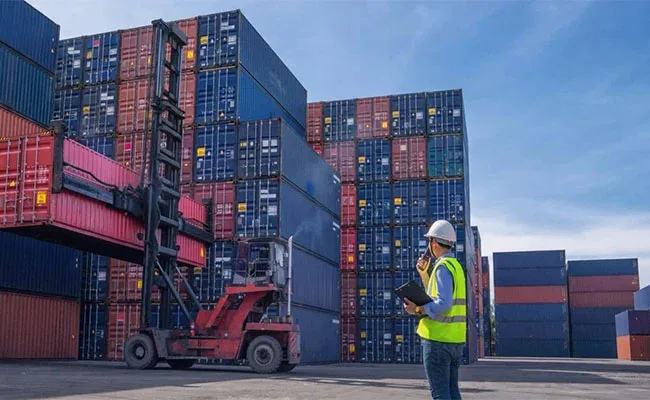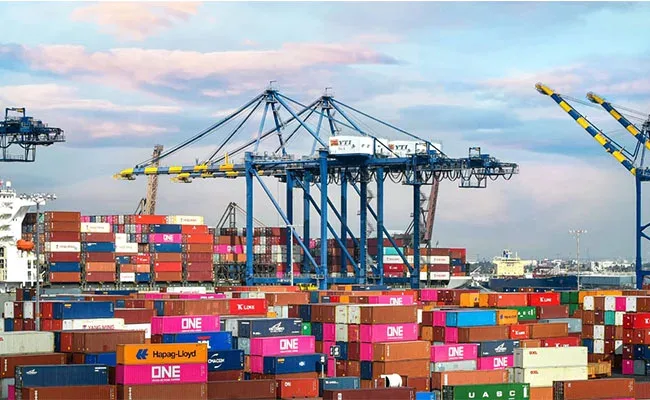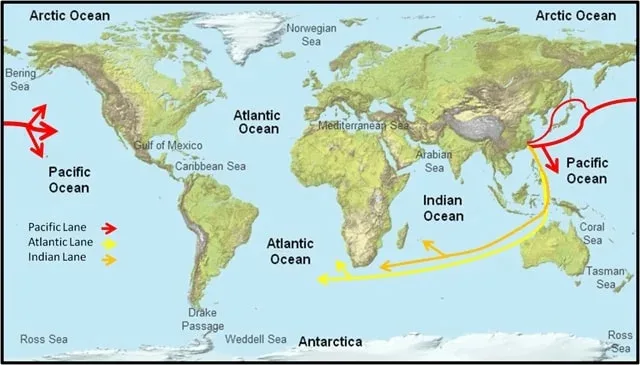Shipping Goods From China To New York
Shipping goods from China to New York involves traversing the vast Pacific Ocean before ultimately entering the Atlantic waters. This journey presents multiple routes and strategies for transporting cargo between the two locations. Here are some commonly adopted paths for facilitating shipments between the major ports of the two nations:
When planning the transportation of goods from China to New York, it is important to consider the diverse range of routing designs and options available. Each approach has its specific advantages and factors to consider. Nonetheless, most shipping routes adhere to the conventional path of crossing the Pacific Ocean and subsequently accessing the Atlantic via key waterways.

The Maritime Shipping Routes From China To New York Present A Variety Of Options, Primarily Encompassing The Following Strategies
Direct Trans-pacific Route
The most direct and widely employed path involves setting sail from major Chinese ports such as Shanghai, Ningbo, and Shenzhen, crossing the expansive Pacific Ocean to reach Western U.S. ports like Los Angeles and Long Beach. From there, goods are transferred via rail or road networks through the American interior, ultimately arriving at destinations along the East Coast, including New York.
Panama Canal Route
Another alternative is leveraging the shortcut provided by the panama canal. vessels depart from china, navigate across the pacific, transit through the strategic panama canal into the atlantic, and then proceed northward to reach numerous ports on the u.s. eastern seaboard, including new york.
Suez Canal Detour Route
For specific cargo requirements or in accordance with carrier strategies, the Suez Canal route offers an alternative. Ships embark from Chinese ports, traverse the Indian Ocean, pass through the Red Sea, utilize the Suez Canal to enter the Mediterranean, continue north along its coast to connecting points, and finally cross the Atlantic to reach destinations such as New York on the East Coast of the United States.
Shipping Cargo Via Containers From China To The Port Of New York

Shipping cargo via containers from China to the Port of New York necessitates a keen focus on the NEW YORK & NEW JERSEY port district. This area encompasses the bustling metropolis of New York-Newark and the neighboring Elizabeth region, serving as a paramount maritime hub within the region. In New York State, the NYCT (New York Container Terminal) plays a pivotal part; conversely, across the river in New Jersey, the PNCT (Port Newark Container Terminal) in Elizabeth operates one of the East Coast’s preeminent container handling facilities—the Maher Terminal. As a gateway to North America’s most densely populated consumer market, the Newark metropolitan area efficiently caters to a vast expanse that includes New York, New Jersey, Pennsylvania, Connecticut, and Massachusetts. It not only ranks as the largest and most active port on the East Coast but also stands as the third-largest in the nation. The port handles a diverse array of goods, ranging from automobiles and textiles to electronics, scrap metal, bulk cargo, and general merchandise, with particularly robust trade exchanges with China.
To illustrate, inquiries regarding “door-to-port” freight costs from key Chinese ports, including but not limited to Shanghai, Shenzhen, Ningbo-Zhoushan, Guangzhou, Qingdao, Tianjin, Xiamen, Dalian, or Hong Kong to New York, necessitate attention to market dynamics and the latest quotations provided by various freight forwarding agents. These prices are subject to fluctuations due to seasonal adjustments, market demands, changes in fuel surcharges, among other variables. Hence, maintaining a strong connection with a trustworthy freight forwarder is imperative to secure the most accurate and timely shipping cost information.
Sea Freight Costs From China To New York
The cost of shipping a container from China to New York can vary due to several factors, including the shipping company, container size, cargo weight, route, fuel prices, and market demand.
Distance And Routing
The distance between the originating port in China and the destination port in New York is a critical determinant of container shipping costs. Longer transportation routes, which entail increased fuel consumption and extended travel times, may lead to higher expenses. The most common routes between China and New York are the Trans-Pacific Route and the Panama Canal Route. The Trans-Pacific Route is more direct and frequently used, whereas the Panama Canal Route involves passage through the Panama Canal to access the Atlantic Ocean before proceeding to New York.
Container Sizes And Types
The choice of container size and type for shipment influences the rate. Standard container dimensions include 20-foot (TEU) and 40-foot (FEU) containers. Larger containers incur higher costs but offer better economies of scale for larger shipments. Moreover, specialized containers, such as refrigerated containers (reefers) for perishable goods or open-top containers for oversized cargo, may incur additional fees.
Cargo Weight And Volume
Freight charges are typically based on either the weight or volume of the cargo, whichever is greater. Heavy or bulky cargo that occupies significant vessel space and requires special handling may result in higher transportation costs.
Seasonal Demand And Market Conditions
Freight rates can be influenced by seasonal fluctuations in demand and prevailing market conditions. During peak seasons, such as holidays or busy shopping periods, rates may escalate due to heightened demand for goods. Conversely, rates tend to be more competitive during periods of lower demand.
Fuel Prices
Fuel costs significantly impact freight rates. With fluctuations in fuel prices, shipping companies adjust fuel surcharges, which can affect the overall shipping costs. This makes fuel costs a pivotal factor in determining container freight rates.
Currency Exchange Rates
Fluctuations in the exchange rate between the Chinese Yuan (CNY) and the U.S. Dollar (USD) also have an effect on container freight rates. Changes in the exchange rate influence the cost of engaging in international trade transactions
Carrier Selection And Service Levels
The choice of shipping line or carrier, along with the selected service level, can also impact container shipping rates. Different carriers may offer varying rates and service options, including transit times and container availability.
Additional Fees And Surcharges
It’s crucial to account for additional fees and surcharges that may apply to container shipments. These fees encompass terminal handling charges, documentation fees, security fees, and other port-related expenses.
Keep in mind that the freight rate is just one component of the total shipping cost. When calculating the overall transportation cost from China to New York, other considerations such as terminal handling charges, documentation fees, customs duties, and insurance must also be factored in.
Learn More: Examples Of Shipping Costs From China To The US
China To New York Ocean Freight Costs

Door-to-Port Shipping Rates from Key Chinese Ports to New York: Departing Ports in China: Shanghai Port, Shenzhen Port, Ningbo-Zhoushan Port, Guangzhou Port, Qingdao Port, Tianjin Port, Xiamen Port, Dalian Port, or Hong Kong Port.
Destination Ports in the New York Area: Port of New York, Port of Newark in New Jersey, Elizabeth Port in New Jersey.
Key Factors Influencing Ocean Freight Costs
A. Demand and Capacity: Ocean freight rates are largely influenced by the demand for shipping services and the available vessel capacity. During peak seasons or periods of increased demand (such as holidays and sales events), rates may soar due to limited space. Conversely, periods of low demand can bring more competitive pricing.
B. Fuel Prices: One of the crucial factors affecting ocean freight rates is the cost of fuel. Fluctuations in oil prices directly impact carriers’ operational expenses. To mitigate the effects of fluctuating fuel prices, some shipping companies implement Bunker Adjustment Factors (BAF) to adjust rates accordingly.
C. State of the Freight Market: Ocean freight prices are also influenced by the overall condition of the global freight market. Economic conditions, geopolitical events, and trade policies all have implications for rate volatility.
D. Trade Imbalance: The trade imbalance between China and the United States can affect freight costs. When more goods are transported in one direction than the other, shipping companies may adjust rates to balance ship loads.
E. Carrier Alliances and Competition: Characterized by numerous carrier alliances and intense competition, the shipping industry sees carriers collaborating through alliances, sharing vessels, and operating jointly on specific trade routes, thereby impacting capacity and rates.
F. Container Availability: Shortages or imbalances in container supply can also affect rates. During periods of high demand, a shortage of containers in certain locations can lead to increased costs.
The Longest Transit Time For Shipping From China To New York
Transporting goods or personal items from China to New York, including electronics, lighting fixtures, machinery, furniture, textiles, food, vehicles, boats, motorcycles, jet skis, RVs, auto parts, personal belongings, medical equipment, and more, initially requires assessing your shipment’s volume and weight. Following this, it is advisable to consult with a freight forwarder based in New York or a shipping agent in China. Your logistics provider will then advise whether a full container load (FCL) suits your needs or if a less-than-container load (LCL), where you share container space, would be more appropriate. For comprehensive transport advice and fee details, reach out to Baseton Logistics.
When shipping from China to the New York metropolitan area, deciding between FCL and LCL depends on your specific shipping requirements. FCL is ideal for large shipments, ensuring security and direct delivery, while LCL is cost-effective for smaller consignments. Regarding transit times from major Chinese ports, the longest estimated duration is approximately 35 to 40 days for shipments from Hong Kong to New York, and around 38 days on average for routes from Guangzhou to New Jersey. Carefully consider your cargo’s nature and urgency when selecting a logistics strategy, and engage directly with shipping specialists to obtain tailored service plans and quotations.
What Are The Cheapest Air Freight Companies From China To New York?
To find the most budget-friendly air freight options from China to New York, collaborating with a freight forwarding service like NEW SPEED Logistics can prove highly beneficial in China. Freight forwarders leverage their high-volume shipping rates to remain carrier-neutral, enabling them to select the most economical airlines regardless of the brand.
Industry insiders often note that China Southern Airlines, Air China, and Eastern Airlines consistently offer some of the lowest rates for flights to the US. However, other airlines such as Cathay Pacific, All Nippon Airways (ANA), and Asiana Airlines occasionally roll out promotional prices throughout the year, which can sometimes dip lower than those of China’s state-owned carriers.
Determining which airline is the cheapest from China depends heavily on the season and which carriers are currently promoting special deals.
For shipments from China to New York, costs are contingent upon shipment type, commodity specifics, dimensions, and the freight forwarder chosen, among other variables. It’s advisable to solicit quotes from various freight forwarders, as each may present different offers. Simplify this process by completing a form on NEW SPEED’s official website; subsequently, multiple freight forwarders will reach out with proposals for your consideration.

